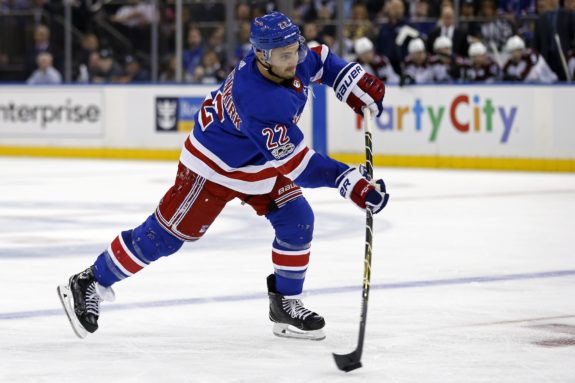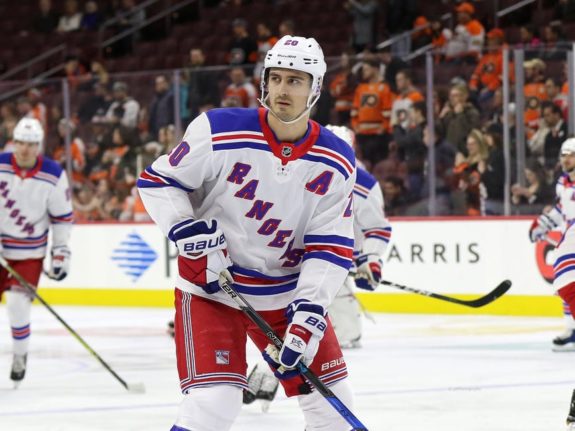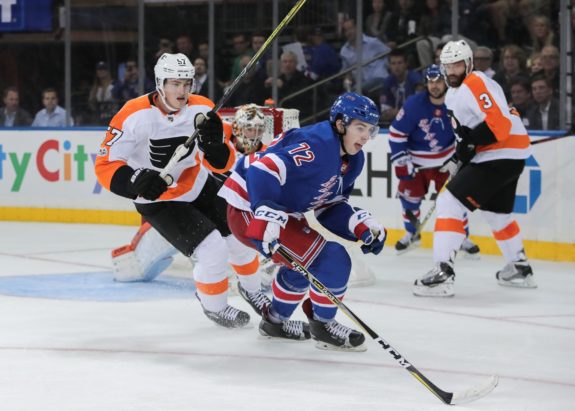The differences between the previous coach of the New York Rangers and the new one are stark. The early results from last season — ones that set the tone for change behind the bench — and the ones from this season are strikingly similar so far.
David Quinn continues to enjoy his honeymoon period with the Blueshirts, which he’s earned with a dedicated approach focusing on accountability, attention to detail and a renewed emphasis on physical north-south play. It’s a radical departure from the style of Alain Vigneault, whose laissez-faire philosophy clearly played a major role in years of sloppy play in the Rangers’ own end and what appeared to become an emotionless, directionless team by the end of 2017-18.
Quinn has so far been everything team management hoped for — not just in approach, but in backing up words with action. Displeased with what he perceived as a lack of physicality from Kevin Hayes in Saturday’s contest against the Buffalo Sabres, he sat the center for much of the final two periods.
Veteran defenseman Kevin Shattenkirk played a career-low 7:29 against the Carolina Hurricanes on Sunday, and he’s stunningly expected to be a healthy scratch against the San Jose Sharks at Madison Square Garden on Thursday. Quinn insists the move “isn’t a punishment,” framing it as a concession to Shattenkirk still struggling to overcome last season’s knee surgery.

Despite the more buttoned-up philosophy, however, a win has yet to materialize. The 0-3 Rangers were defensively competent in a 3-2 loss to the Nashville Predators on Thursday and a 3-1 defeat Saturday. They finally broke out offensively Sunday, but the impressive defensive play disappeared in shocking fashion in an 8-5 loss.
Vigneault’s Rangers began 1-2 last season, falling 4-2 to the Colorado Avalanche in their opener before (theme alert) an ugly 8-5 defeat to the Toronto Maple Leafs, followed by a 2-0 victory over the Montreal Canadiens.
Rangers More Disciplined, Not More Talented
That team went on to lose its next five games, and team brass can only hope that doesn’t happen to their rookie coach, who projects extreme confidence but remains in the learning stages of what works in the NHL. Quinn’s reaction has been encouraging, as he’s focusing on the mood of his players and apparently not his own.
“I think you always do as a coach. You want to have the pulse of your team,” Quinn said after the Hurricanes loss. “You can see body language and frustration set in when you have the chances we had and the zone time we had (against Buffalo) and not get rewarded for it. You gotta make sure you manage that. That’s part of being a professional athlete, managing your emotions. That’s a challenge. I think it’s the hardest challenge for any athlete in any sport.”
Quinn, of course, hardly needs worry about his status with his bosses. He was hired for the long game, to teach the youth being brought into the organization during a methodical rebuild. If the Rangers continue to struggle, it won’t be seen as an indictment of his coaching; instead, it will provide a crystal-clear reminder of just how far away the roster is from a return to competitiveness.

Amid all the excitement surrounding the hiring of the former Boston College coach, which followed the headline-grabbing trades of star veterans for future assets late last season, what was perhaps forgotten is this: The Rangers simply don’t have that much big-time talent. The lineup remains a hodgepodge of highly paid veterans and younger players, few of whom are considered to have particularly high ceilings at this point.
Playing the actual games, even only three of them, has laid that bare.
“We can hang our heads and feel bad for ourselves, but no one else does, or we can learn from it,” said winger Chris Kreider, who scored his first two goals of the season Sunday and is among the group of 20-something Rangers whose futures with the club are anything but secure. “Plenty of teams go through tough, trying times during the season, and personally, I’d like to go through it now rather than later. We’re going to find our stride and keep practicing to keep on getting better and continue to work on our process and our system. The best is definitely ahead of us.”
Rookies, Holdovers Auditioning for Future Roles
Many of the new younger players acquired via trade or the draft aren’t ready for the NHL and are instead developing in the AHL, in college, in the KHL. Quinn’s challenge this season is to get the most out of the potential future core pieces who did make the team out of training camp – rookies Filip Chytil and Brett Howden along with perhaps Neal Pionk and Tony DeAngelo — as well as holdovers Kreider, Hayes, Pavel Buchnevich, Jimmy Vesey, Mika Zibanejad, etc.
Once viewed as potential building blocks for the future, the veteran 20-somethings are auditioning under the new coach to retain that status. At the very least, Quinn would like those players to perform well enough to hold the line while the more highly regarded youngsters grow into expected key roles with the big club.

The problem is that Quinn is now wrestling with the same personnel shortcomings that helped sink the much-maligned Vigneault. The glaring needs remain the same as they were last season: An elite scorer, a legitimate No. 1 center and a shutdown defensive pair, to name a few.
Again, the scoreboard isn’t the primary concern this season. The theme, as Kreider mentioned, will be learning — for the players, for Quinn and most importantly, for management, which needs to gauge just how far the team needs to go and how much work remains to be done going forward.
The answer to that question, to this point, appears to be quite a bit.